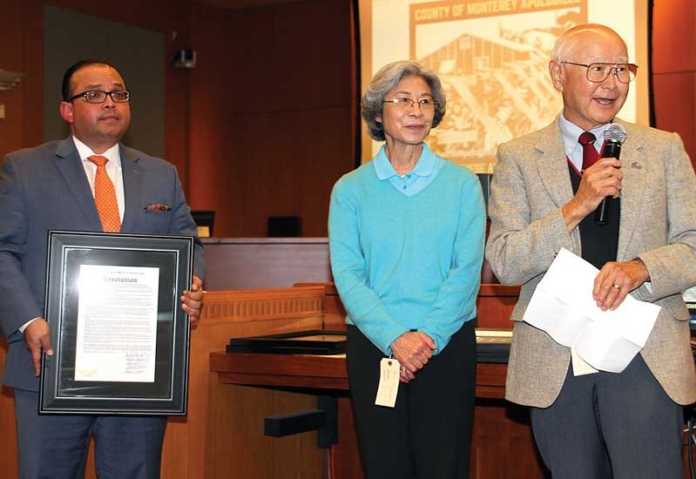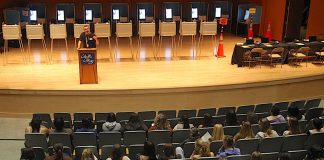(Contributed photo)
SALINAS — Seventy-six years after more than 120,000 people of Japanese ancestry were imprisoned across the nation, the Monterey County Board of Supervisors issued a formal apology.
Supervisor Luis Alejo also presented the apology resolution on Tuesday to the Watsonville-Santa Cruz Japanese American Citizens League, among other JACL chapters and individuals.
According to retired Watsonville High School teacher Mas Hashimoto, the apology by the supervisors marks the first such resolution by a local government agency in the United States.
“We are so grateful to the Monterey County Board of Supervisors for this resolution,” said Hashimoto, who was imprisoned at age 6 in Salinas with his family before being sent to Arizona.
Two months after the Dec. 7, 1941 attack on Pearl Harbor, President Franklin D. Roosevelt signed Executive Order 9066, ordering more than 120,000 people of Japanese ancestry living on the West Coast, both United States citizens and non-citizens, to be moved to internment camps throughout the country.
More than 3,500 Monterey Bay Area residents were temporarily sent to the Salinas Rodeo Grounds before they were imprisoned in Poston, Ariz. beginning in May 1942.
Tuesday’s meeting opened with the pledge of allegiance led by Mas and Marcia Hashimoto of Watsonville.
Historian Sandy Lydon, who gave a presentation on the events leading up to the incarceration, stressed the significance of the Hashimotos leading the pledge.
“When Mas Hashimoto, who was in this camp in Salinas, stands up and leads the pledge of allegiance, you need to understand just how important that is, how remarkable that is,” Lydon said.
On April 12, 1943, the Monterey County Board of Supervisors passed a resolution protesting the release of Japanese Americans from the camps. The supervisors rescinded that resolution in 2002, but did not issue a formal apology at the time.
Marcia Hashimoto, president of Watsonville-Santa Cruz JACL, said the signing of the Civil Liberties Act in 1988, which granted reparations to those incarcerated, gave the Japanese a “great moment of freedom.”
“This apology is a tremendous part of healing for our community,” she said. “We sincerely appreciate it.”
Alejo said when he graduated from Watsonville High School in 1992, there were five Japanese Americans who had been imprisoned during WWII finally receiving their diplomas during the ceremony.
“This moment today is very special to me,” he said.
Supervisor John Phillips called the United States’ treatment of Japanese during World War II a “terrible time in our country.”
“This is long overdue,” he said of the apology. “I’m glad to be a part of a board of supervisors that finally says we’re sorry and we regret the great loss that we put on you.”












